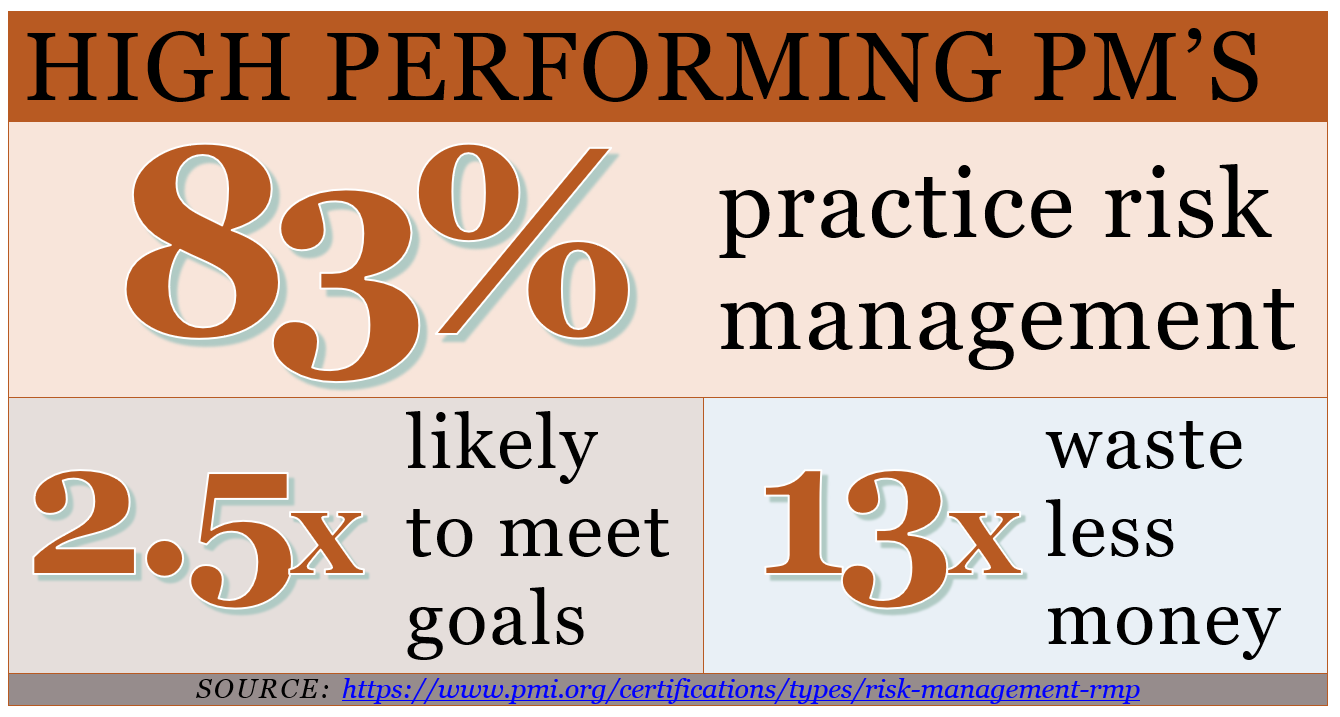Economic Shifts due to Covid-19: Risk is Constant
Although risk has always been inherent in business, almost no industry was prepared for the global economic impact of Covid-19. March 16, 2020 saw the Dow Jones largest-ever single day fall, and the impact on global stock markets is still not fully known. Now, more than ever before, companies are looking to lower their losses and protect their assets. As Project Managers, we need to be aware of potential threats in order to prevent them; also known as Risk Management.
On this page:

As the international consulting firm McKinsey shared in their June 11 Executive Briefing, industries ranging from fashion, hospitality, infrastructure, institutional-investing, nursing, and public-transport sectors are both adjusting to and planning for ever evolving challenges. As organizations develop post Covid-19 plans, risk is of upmost concern; securing professional Risk Management Certification for you or your employees can be a powerful tool for the present and for the next version of normal.
Risk Management as Professional Certification
International consulting and staffing firm Accenture’s May 2020 Outmaneuver Uncertainty report states that “…Leaders are rapidly turning their attention to the Next, a period of unpredictable and possibly muted economic recovery with new competitive threats and opportunities…” and organizations are seeking “…to diffuse enterprise risk.” Prior to Covid-19, risks were identified and managed within a mostly known set of parameters. With the societal, health, social, and business ramifications of the pandemic, risk itself has changed. Businesses seeking expertise to manage their potential for risks would prefer those with high-specialized training and verified credentials.
The Project Management Institute® (PMI) manages the Risk Management Professional® (PMI-RMP®) program in which employers know a verified standard has been reached by the certificate holder:

Managing risk is not optional today and certainly not moving forward; it is a business-critical skill. It’s important to manage risk, especially as we move forward. Data is already emerging that “an enterprise-wide ability to absorb uncertainty and incorporate lessons into the operating model quickly” is required as the Post Covid-19 world is navigated.
Studying for the PMP Exam?
PMI-RMP® Certification
When deciding how to advance your company’s project management office (PMO) or individual project managers skills, an initial step is supporting efforts to obtain the Project Management Professional (PMP®) certification. An additional level of expertise and specialty skills is the PMI Risk Management Professional (PMI-RMP®). After all, any business seeks to avoid the costs of project failure.
PMI describes their PMI-RMP® as a skillset focused on the “ability to identify and assess project risks, mitigate threats and capitalize on opportunities.” Even five years ago, PMI’s Pulse of the Profession® report revealed the positive business impact of employees with formal Risk Management training:

Managing Risk Can Benefit the Business
Increasing risk management knowledge helps prepare you or your project managers for projects with increased complexity, elements of crisis management, and higher impact risks. Starting you or your project managers on this skill-based journey can have both immediate and long-term benefits, including:
- Demonstrating the company’s focus on project management standards can lead to consistent outcomes,
- Increasing employee development frequently increases talent retention,
- Decreasing risks leading to increased project savings, and
- Increasing project success rates enhancing employee morale.
A manageable investment in your employees’ professional development can have lasting positive impacts for your business regardless of industry. There are many ways to invest in your employees’ professional development. Offering training and certifications is a great way to help them grow.
Fast Track Your Employees’ Risk Management Training
In risk management, it’s important to identify the high performers who would benefit from growing their skills in the management of uncertainty within projects. Then, after talking with them about the training opportunity and expectations, start with an entry-level resource like the 2 hour Risk Management Fundamentals or 1 hour Common Risk Management Mistakes Course on demand modules. If they have a deep project management expertise, you could consider starting with the 8 hour Strategic Risk Management on demand course. When the employee has the required work experience for the certification process and testing, support their efforts in the PMI Risk Management Professional (PMI-RMP)® Certification Prep class.
No one can predict the future, but your business will be better positioned to adjust to market changes when there is a supported culture of risk management within your project management team.
Upcoming PMP Certification Training – Live & Online Classes
| Name | Date | Place |


 New Horizons
New Horizons
 Project Management Academy
Project Management Academy
 Six Sigma Online
Six Sigma Online
 TCM Security
TCM Security
 TRACOM
TRACOM
 Velopi
Velopi
 Watermark Learning
Watermark Learning
 Login
Login




 New Horizons
New Horizons
 Project Management Academy
Project Management Academy
 Velopi
Velopi
 Six Sigma Online
Six Sigma Online
 TCM Security
TCM Security
 TRACOM
TRACOM
 Watermark Learning
Watermark Learning